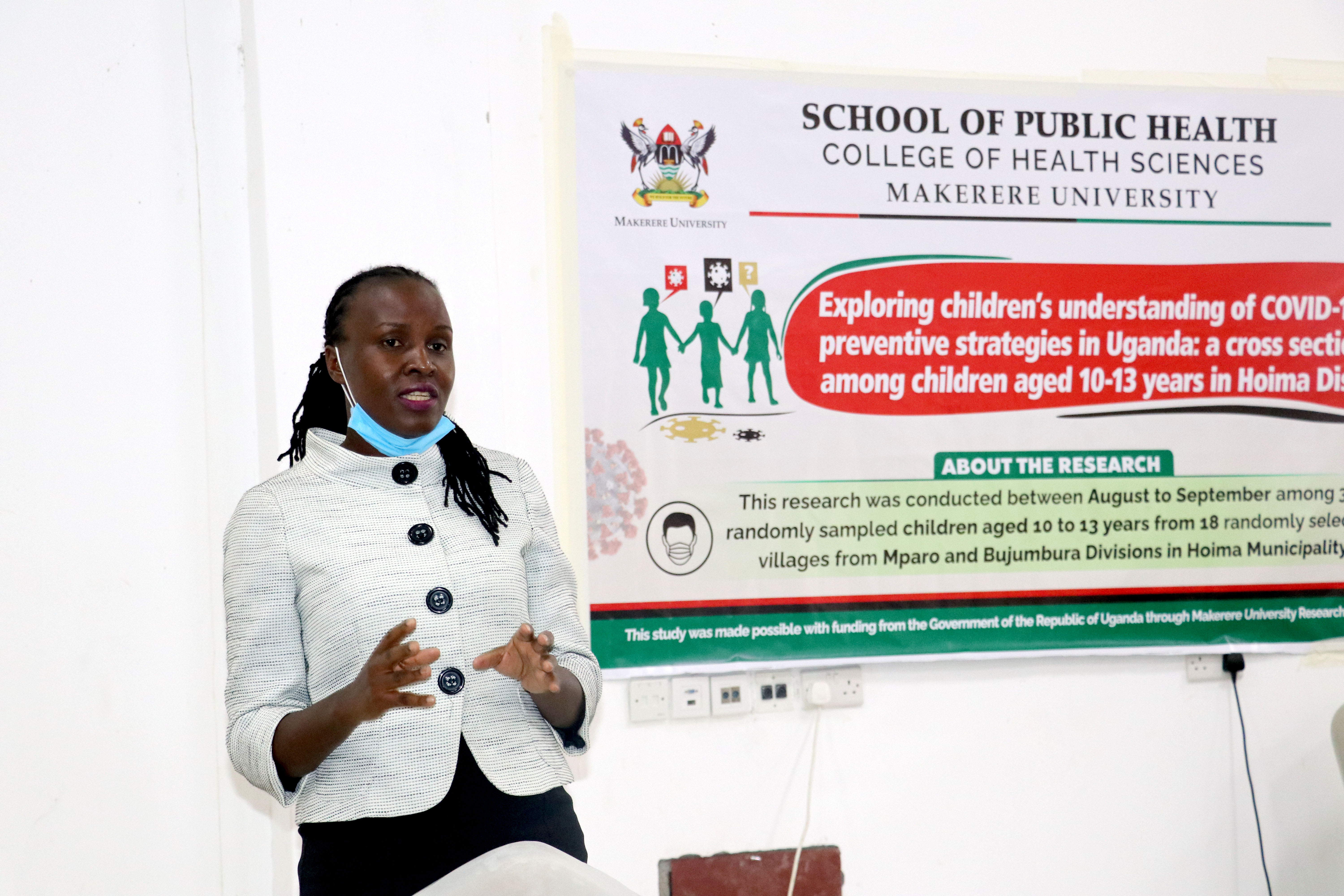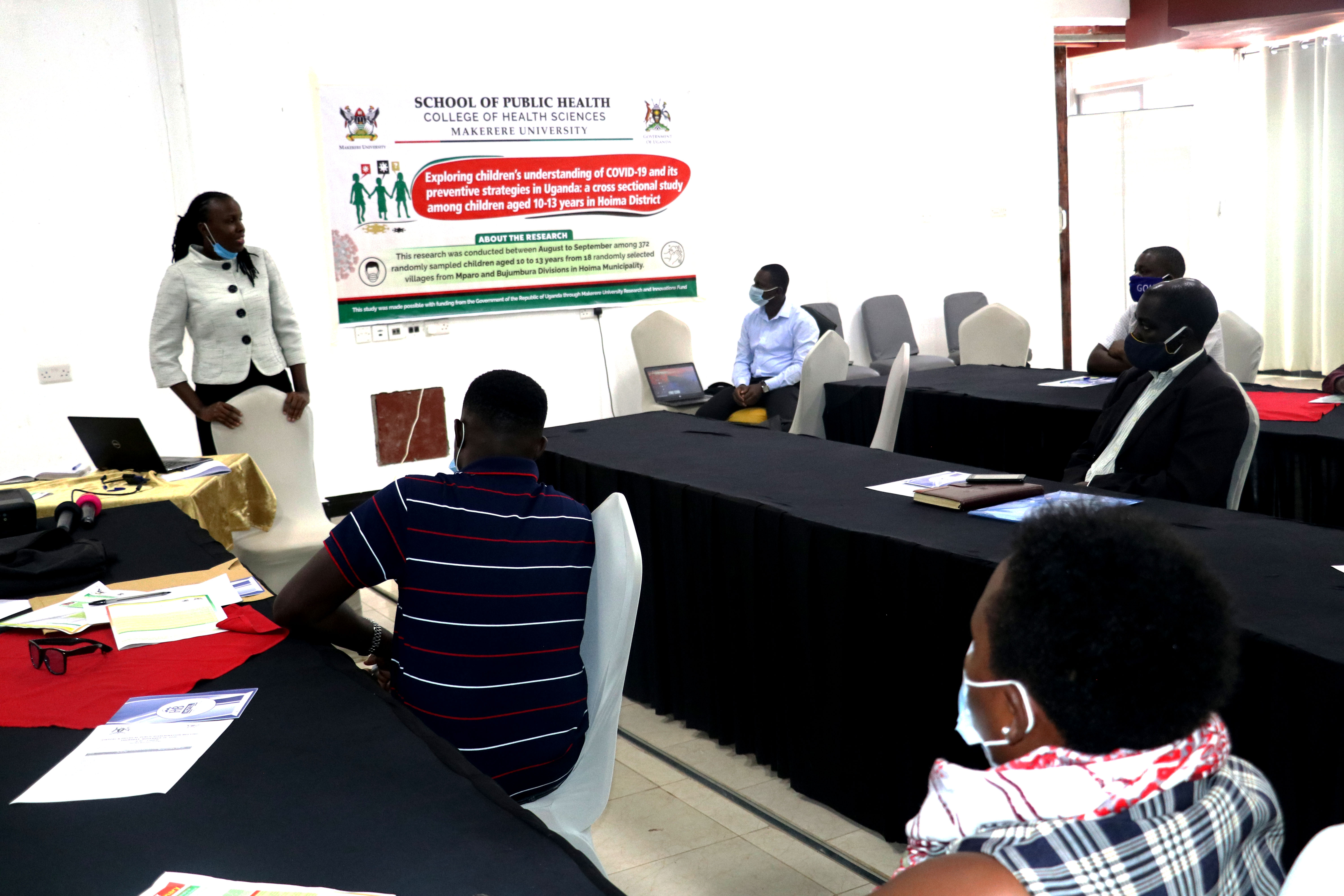
Hoima —Thursday 26/11/2020: Nine-in-ten children in Hoima district do not know how to properly wash their hands amidst the coronavirus pandemic, a study released by School of Public Health at Makerere University has shown.
As the second wave of COVID-19 surges, children remain a vulnerable group that require protection and interventions aimed at protecting them (children) from contracting the virus.
Wearing face masks in public, and even practicing social distancing and proper hand washing have been advanced as key measures for reducing the spread of coronavirus through risk communication.
Researchers however revealed while releasing study results entitled: Exploring Children’s Understanding Of COVID-19 and its Preventive Strategies in Uganda on Thursday that current crisis communication in response to coronavirus is mainly designed to and for adult audiences as opposed to both children and adults.
Latest findings of the study conducted between August and September found that children were knowledgeable of COVID-19 transmission. At least seven out of ten children knew what caused COVID 19 and how it is spread.

Majority of the children (75%) knew that Coronavirus is spread through droplets while 85% knew at least one symptom of COVID-19. Majority children identified cough, and other flu-like symptoms plus fever as key coronavirus symptoms. Only three children reported to know that sudden loss of smell and taste were symptoms of COVID-19.
None of the children interviewed however, knew how to properly wear face masks. “None of the children followed all the recommended steps when putting on a mask and less than 1% followed the recommended steps for removing a face mask. This is a big challenge that could endanger them especially at a time we have rapid spread of the virus,” says Dr. Christine Nalwadda, a Principal Investigator.
Study results show that slightly over 22.3% (83 children) washed their hands with soap and water before touching the mask and 31.18% (116 children) avoided touching the mask surface. Eight participants did not follow any of the recommended steps when putting on a facemask.
When asked to demonstrate how to remove a facemask, only two children (0.54%) followed the recommended steps when removing a facemask.
A total of 372 randomly sampled children aged 10 to 13 years were interviewed from 18 randomly selected villages from Mparo and Bujumbura Divisions in Hoima Municipality.
Researchers say they chose to do this research in Hoima because it was one of the districts where the first COVID-19 case was recorded in April. Hoima is also a border district, making it a risky district. Additionally, Hoima has a regional referral hospital which is a regional COVID-19 treatment centre.
Uganda is currently experiencing a surge in the numbers of COVID-19 cases, with a cumulative number of 11,767 cases and 106 deaths as of 17 November 2020.
Equally so, the number of children cases in the country also continues to gradually increase. For instance, between March and June 2020, about 12 cases registered, by mid-September 2020, over 92 COVID-19 cases in children were reported by the health Ministry. Additionally, other resulting impacts of COVID-19 have significantly threatened many more children’s lives than the disease.
Researchers say in the current event that there is no vaccine, nor curative treatment, effective management of COVID-19 is largely dependent on risk-communication and prevention strategies.
“The focus of risk communication should be beyond the preventive messaging. Stakeholders should find innovative ways of teaching children how to overcome COVID-19 and enhancing the young people’s role as agents of change is of global and national interest and is urgently required given its implication in reopening of schools and intergenerational contacts,” says Lydia Kabwijamu, a Co-Investigator.
She adds that children should be empowered on how to implement the best practices such as handwashing and safe wearing of facemasks.
The study was conducted with a view of exploring the children’s understanding of COVID-19 and its preventative strategies in Uganda to contribute to efforts of the ongoing COVID risk-communication among children. It was funded by the government of Uganda through the Makerere University Research and Innovations Fund—MakRIF.
When the COVID-19 pandemic struck the world, a big concern for parents was young children mixing at school, typically a hotbed for spreading stuffy noses and tiny coughs to adults. Uganda took early lockdown measures to slow down the spread of coronavirus. But with the reopening of schools for candidate classes, there was a greater need to understand the children's understanding of COVID-19 and its preventive measures according to researchers.
But when asked about their experiences and interpretation of the COVID-19 lockdown, children expressed happiness that they had spent time with their families, learnt chores and slept longer than they usually did when at school.
They however stated vividly that they were missing school and majority seemed uncertain about resumption of school activities.
“Due to prolonged stay at home, some feared that they would learn bad habits like stealing while others feared that their classmates would not return to school because they got pregnant,” says study report.
Key recommendations:
- The researchers propose that Ministry of Health and Ministry of Education and Sports to focus on how children aged 10-13 years can correctly perform the COVID-19 preventive measures.
- Schools should ensure that the recommended preventive measures are in place including enough water and soap for handwashing, disinfectant to sanitize surfaces, in addition to deploying thermometers to take temperatures for all visitors.
- Schools should also be aware that children have several fears about COVID-19 effect. So there is need to prepare for appropriate psychosocial support for them.
| Attachment | Size |
|---|---|
| Study Summary Brief (1.03 MB) | 1.03 MB |
| Press release (127.16 KB) | 127.16 KB |

